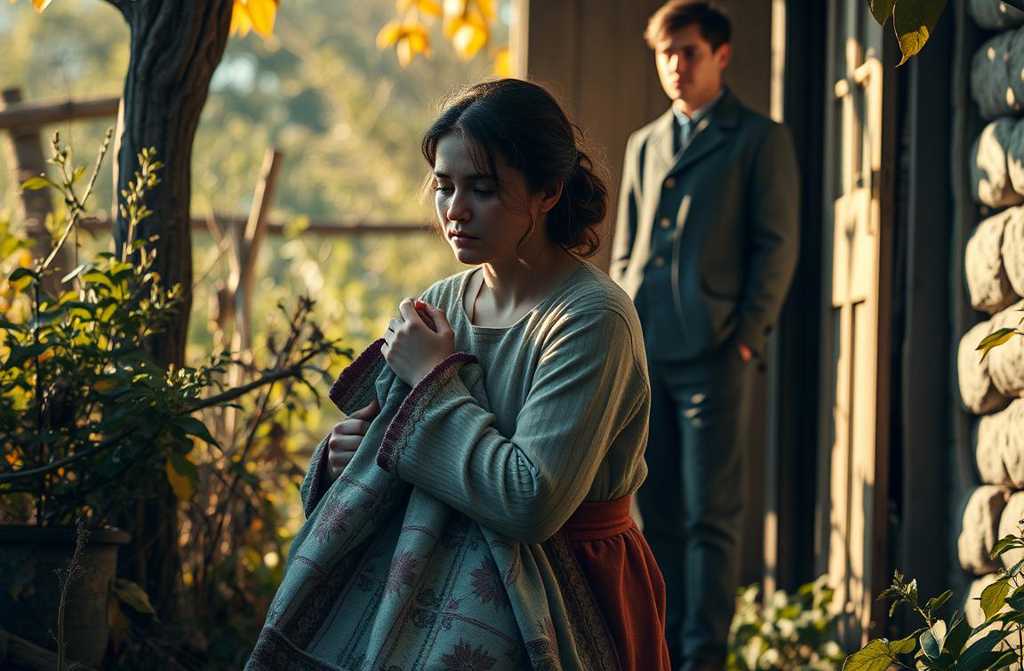Life is not a stroll through a meadowits a winding path with thorns and stones. The tale of how Irene stole her sisters husband set the whole village abuzz. Only the deaf failed to hear the news, and only the mute couldnt repeat it! For the villagers, it was the juiciest scandal in years, a feast for gossip to be savored and seasoned with ever more elaborate details. To some, it was mere chatter; to others, a cruel twist of fate.
Nicholas had married Helen far too youngor rather, it was high time for him to settle down, while she was still more suited to playing with dolls. Helens parents drank heavily, neglecting their four children. As the eldest, she bore the weight of the household. Thanks to her care, her younger siblings were fed and clothed, though the family had little else. Helen washed, cooked porridge, walked the little ones to school, checked their homework, and still managed to excel in her own studies, nearing graduation.
One afternoon, Helen returned from school to find their home reduced to smoldering ashes. Neighbors stood in clusters, murmuring that by the time the fire brigade arrived, the house was already engulfed. Her parents, lost in a drunken stupor, never made it outwhether her father had fallen asleep with a cigarette or some other mischance had befallen them, no one could say. Helen wailed, lunging toward the still-smoldering wreckage, collapsing into the filthy muck. But nothing could be done.
Her siblings were taken to an orphanage, while Helen was placed under the care of her fathers half-sister, Aunt Anne.
Life with Anne was peaceful, though the woman herself labored endlesslyfirst at work, then at homeruling her household with an iron will. Yet she was gentle with Helen. Annes husband, William, was a quiet, hardworking man, tall but bent under his wifes stern gaze. The house knew no shouting, no drunken revelryunlike the chaos Helen had grown up with. At first, she marveled that life could be so calm. She feared no work, and though Aunt Anne pitied the orphan, she never assigned chores; Helen took them upon herself, doing all she had learned from childhood.
Then Nicholas returned from the army, and Helens life shifted. Tall and well-built, with unruly dark hair he constantly smoothed back, he had a gaze that made the village girls swoon. Fights broke out near the pub as they vied for his attention. Like his mother, Nicholas was diligent, skilled with his hands, and though William was not his blood father, he had inherited his quiet, steady nature.
Anne had borne Nicholas out of wedlock, bringing him “in her apron,” and only she knew his true father. When William proposed, she accepted at oncenot for love, but because few men would wed a woman with anothers child. Yet in time, affection grew between them, and their sturdy marriage brought three more children. The middle son, Max, died before turning three, but their daughters, Mary and Rose, were their joy. So they doted on Helen, their orphaned niece.
Anne noticed something amiss with Helen at oncethe slight girl had grown thin, often nauseous, her eyes swollen with tears. She had seen how Nicholas looked at her, and so she knew.
“Out with itno lies,” she demanded one evening after supper, summoning her son. “Whats happened between you two?”
“Between who?” Nicholas feigned ignorance.
“Dont play the fool! With Helen!”
“I love her,” he said firmly. “And she loves me.”
“I can see more than thatshes carrying your child, isnt she? Fetch her here!”
Nicholas brought Helen in, an arm around her shoulders as she trembled like a leaf.
“So, youve fallen for each other? How long have you been sick, girl?”
“Two months,” Helen whispered.
“Mother, the child is mine. Ill take responsibility.”
“Of course you will. Youll marrywhat else? I wont have this orphan wronged!” Then, softening, she turned to Helen. “No tears, love. Youll be eighteen soon, and then well have the wedding.”
The wedding was splendidthe whole village celebrated! For Helen, it was a dream shed only read about in books. Two days of feasting, broken dishes, and ale flowing freely. Every tradition was honoredthe bread loaf with sprigs of holly, the ribboned tree, the playful ransom for the bride. Gifts piled highfine china, embroidered linens, even a goat and a pair of geese from Nicholass godparents. The bride, radiant in white, blushed as Nicholas whispered in her ear.
The next day, they feasted on noodles from a fat rooster, cold meats, and jellied broth. Latecomers were forced to kiss a grimy pan, and dancing went on late, coins scattered for prosperity. Songs filled the airold ballads of love and labor, until Anne, merry with drink, grew hoarse from singing. William, usually sober, swayed with the matrons until a sharp nudge from his wife sent him to bed.
The newlyweds settled into Williams late mothers cottagesturdy but in need of work. Nicholas patched the roof and fence while Helen and Anne whitewashed the walls. Soon, they had livestockthe wedding geese and goat joined by piglets and hens. That night, they pledged their vows:
“Together forever, in love and sorrow, in health and hardship, come what may.”
A housewarming brought more gifts, including hand-embroidered towels from Anne.
Life flowed like a riversometimes smooth, sometimes jaggedbut the couple thrived, to their neighbors envy. Within a year, Helen bore a daughter, then a son. Happiness bloomed.
Then, by mutual consent, they took in Helens youngest sister from the orphanage.
Irene had just turned seventeen.
Anne begged them to reconsider. Her wise heart sensed disaster. And she was right.
Irene was taller, bolder than Helenlazy as if raised in luxury. Her room was a whirlwind of clutter, while she preened before mirrors, twisting curls around her fingers. She sauntered past Nicholas, ensuring he noticed.
“Posh airs for an orphan,” the neighbors clucked. But Irene cared not a whit.
Truth be told, she cared little for her sisters husbandbut Helens happiness galled her. She longed to spoil it.
Then Annes ailing aunt summoned her. She and William left at dawn, instructing Helen on chores while Nicholas tended the farm.
That morning, Helen milked the cow while Nicholas fed the pigs and stacked hay. Their little girl cried, “Mama, Ronnies fever wont break!”
Helen rushed inside to find her son burning uplikely from yesterdays river swim. They bundled him off to the city hospital in a neighbors car. By evening, Helen calledboth children were admitted with a new strain of flu. Nicholas meant to join her but missed the last bus.
Irene, suddenly domestic, cooked suppera first. Nicholas assumed she worried for the children.
Exhausted, he dozed off after tea, unaware Irene had slipped something into his cup…
Anne slept fitfully that night, her heart heavy with dread. She called home repeatedlyno answer. At dawn, she and William hurried back.
She went first to her sons house. Why wasnt he mowing the dew-laden grass? Why did the cow bellow untended?
What she saw hardly surprised her.
Nicholas sprawled in bed, Irenes naked limbs entwined with his.
Anne yanked the sheet away, recoiling. “Naked! Have you no shame?”
Nicholas woke, baffledhis head pounding as if from a barrel of wine.
Irene stretched like a cat. “Ask your son what happened. He dragged me hereI fought him!”
“Fought so hard your dress flew off?” Anne snapped. “Out, harlot!”
“Ill stay. Nicholas will divorce Helen and marry me. Or shall I report him? Im underage.”
Anne paled. “Helen warmed a viper at her breast.”
“Spare me the theatrics.”
Nicholas sat mute, his head in his hands.
Helen returned at dawn for the childrens things. A warm October morning, yet her heart was cold.
Near home, she heard shouting. Neighbors fell silent, eyeing her strangely.
Anne and Irene argued fiercely. Nicholas sat paralyzed.
One glance told Helen all.
Seven years passed in a blink.
Helen moved to the city, despite Annes pleas. Nicholas begged forgiveness, swearing nothing had happenedbut her heart turned to stone.
Irene vanished, resurfacing years later at a market stall, brash and crude. She bore a child, abandoned at birth, and later stabbed a drunken lover, landing in prison.
Nicholas never remarried, living alone, a shadow of himself. Only Helens rare visits with the children brought light.
Helen rebuilt her life. The first years were hard, but time dulled the pain. She met Stephenkind, devoted, a father to her children. Happiness returned.
Then tragedy struck like a summer storm. Stephen died in a crash, leaving Helen numb with grief.
Nicholas came at once when his daughter called.
Time, they say, heals. Perhaps not all wounds, but it softens the edges, stills the tempest.
Slowly, Helen returned to lifefor the children, for peace. Nicholas, ever patient, stood by unseen.
Perhaps one day, their hearts would mend. Perhaps love would return. But life, as ever, would decide.
For as the saying goes, “Living a life is no stroll through a meadow.”







